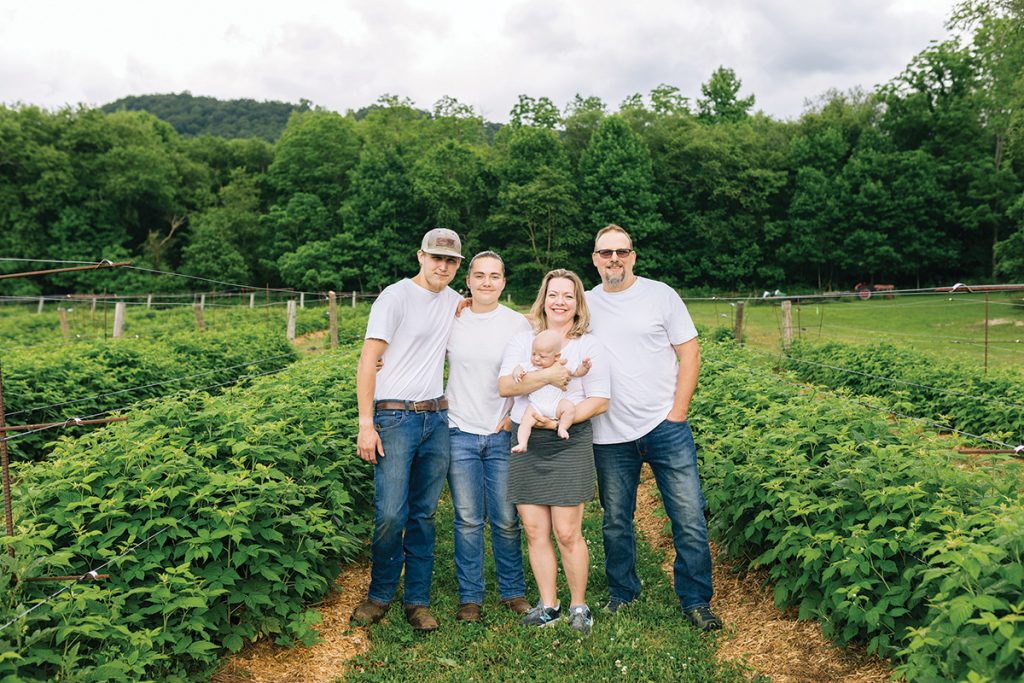Henderson County farm specializes in a delicate, coveted fruit

THE FIELDSES IN THE FIELD
The family enterprise includes (l-r) Jacob, Lydia, Stacy, baby David, and Chris.
Photo by Rachel Pressley
Stacy and Chris Fields didn’t intend to be farmers. In fact, they both met working in the construction industry — he as a builder, and she in sales. But when the financial crisis of 2008 caused the construction industry to grind to a halt, they started thinking about the need to diversify their means of income.
“We both went through the 2008-2009 [recession], and we decided, at that point, it was probably a bad thing to have both of our careers in that industry,” says Stacy. “So we decided to grow something as a back-up income.”
Locating from West Jefferson, the couple began to look for property. “We wanted more than an acre or two. But to justify that land purchase, we said, ‘Oh, we’ll grow something and make the land pay for itself.’ Yeah… famous last words,” continues Stacy, laughing. They finally bought a seven-acre plot of land in Henderson County, in the Goodluck neighborhood near Hooper’s Creek. “We discussed quite a bit what we were going to grow. My grandmothers grew raspberries, so that’s always been my favorite fruit, and I knew that was something I could sell.”

LUCK AND LOVE
Learning to deal with tricky weather (like this year’s late frosts) and a very perishable fruit is all part of the raspberry growing process. Scenes from the farm in Henderson County, and baked goods at the farmers’ market.
Photo by Rachel Pressley
After tending to the soil, they planted an acre by hand with raspberry root stocks in 2017, founding Raspberry Fields farm. Their intention was to continue to expand, adding another acre every year, but by the time the gravity of their undertaking dawned on them, they decided to stick with that single acre and the bounty it provided.
“That acre is very labor intensive, because we have chosen to grow organically,” says Stacy. “It’s a huge multiplier to the man hours, being out in the field. We don’t spray with pesticides and chemicals that are outside of organic guidelines. When you grow that way, you are weeding and mulching, and doing everything by hand that you wouldn’t necessarily have to do with a traditional method.

“We decided that, if we were going to farm it and be in it all the time, we didn’t want to be in the junk,” she adds. Like a lot of farmers these days, the Fieldses chose not to go through the lengthy and expensive process of organic certification. For them, going organic wasn’t about using the label for marketing leverage — it was about their family and their community. “We wanted to make sure that we were farming in a sustainable way, that didn’t make us worry that our kids were in it and walking around in it.” (Lydia, 15, and Jacob, 21, are working members of the farm; baby David is four months old.)
“‘What’s healthy for our farm, what’s healthy for us, and what’s healthy for our customers?’ she muses. “So that’s what we landed on, and yes, it’s more work, but the quality of what we are producing is so much better.”

They began selling their harvest at the weekly Hendersonville Farmers Market — a venue that rebranded and expanded last year — and through CSAs like Tractor Food & Farms. They also plan on selling online, with pickup locations at the farmers market. (The Fieldses grow a raspberry variety called “Autumn Bliss” that fruits July through September.)
Western North Carolina is thick with blueberry operations, but it’s much harder to find dedicated raspberry farmers. Unlike harder-skinned blueberries, which tend to keep well, “raspberries are a very delicate fruit, very perishable,” Stacy notes. “We pick our fruit and within one to two days, it’s in the hands of the end user. That type of turnaround time is difficult, especially on a large scale. Most growers choose fruits and vegetables that are more forgiving. All produce needs to move quickly — but raspberries are insanely quick.”

Raspberries have to be handled and packaged with extreme care. “It’s all hand work for us,” she points out. “Larger-scale raspberry farms use specialized machinery, which costs a fortune.”
Since the shelf life of their product is so brief, “we [also] had to figure out how to put it in a jar,” Stacy says.

And so Raspberry Fields now makes and sells raspberry preserves, infused vinegars, and baked goods like muffins and pound cakes, turning a perishable harvest into all kinds of consumables. “We can’t have any waste,” she explains. “Our zero-waste tolerance is the only thing that keeps us sort of in the black.”
For more information or to order Raspberry Fields bulk berries and products, e-mail localraspberries@gmail.com or visit the website: www.raspberryfieldswnc.com. Also see the farm’s Facebook or Instagram pages (@raspberryfieldswnc) and catch them at the Hendersonville Farmers Market every Saturday from 8am-1pm at the Historic Train Depot, 650 Maple St.



